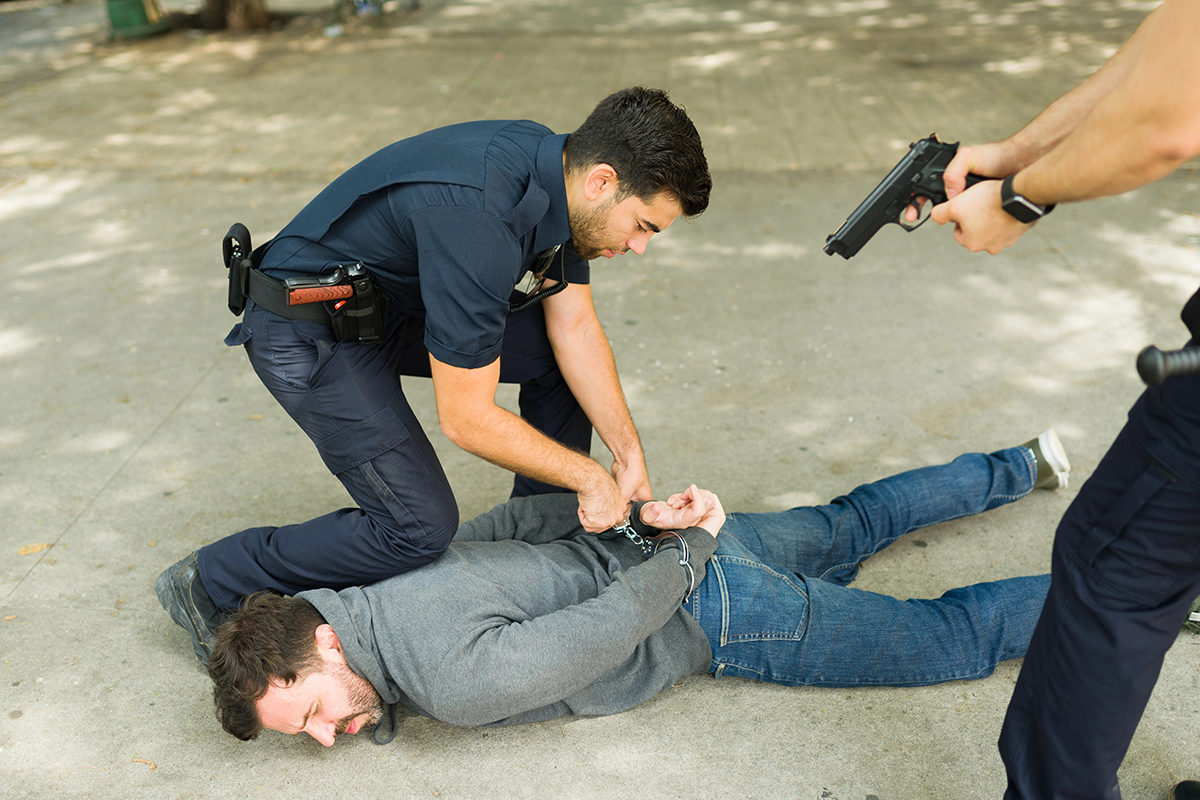If you are facing resisting arrest charges, you need a criminal defence lawyer in Calgary to look at your case as soon as possible.
If you get in the way of a police officer doing their job or follow their directions, you could be found guilty of resisting arrest. This could include if you try to avoid being arrested by running away, hiding, or fighting the police. For additional clarifications on how these situations are typically handled, you might want to check out our Search Frequently Asked Questions page.
The offence is not limited to situations where you are being arrested for another crime. It can include resisting or obstructing police who are conducting other work. For example. investigations, serving documents, or performing other lawful duties.
Resisting arrest is a hybrid offence, which means that the Crown prosecutor can choose to charge the person with either a summary conviction or an indictment, depending on how serious the case is. If someone is found guilty of a summary conviction, they could go to jail for up to two years, pay a fine of up to $5,000, or both. If you are charged with an indictment, the maximum is still two years imprisonment.
The court looks at a lot of things when deciding on a sentence, like how much resistance there was, if violence was used, if the officer was hurt, and the person’s criminal record.
Strategic Criminal Defence is a top Google-rated criminal defence firm in Calgary, with over 600 5-star reviews. Our firm, and our experienced legal team, have defended clients in over 10,000 criminal cases. Leveraging our extensive network of lawyers and decades of experience, we craft defence strategies to help those accused of resisting arrest beat the charge.
The lawyers at Strategic Criminal Defence are both highly experienced and dedicated to defending your rights and future in the face of these charges. Contact a lawyer today by calling (403) 719-6410.
Key Takeaways
- If you stop a peace officer from doing their job or get in their way, you are resisting arrest.
- This includes fighting back when the police arrest you, running away, or getting in the way of their investigations.
- It’s a hybrid crime, which means the Crown can choose to file an indictment or a summary.
- If you are found guilty summarily, you can only go to jail for two years or pay a $5,000 fine.
- If you are charged with an indictment, the most you can get is two years in prison.
- Some common conditions of bail are reporting to the police, not having weapons, staying away from certain places, and not talking to police officers or witnesses who are involved.
- The punishment increases if violence was used or officers were hurt while trying to stop the resistance.
- If someone commits their first offence and the details of it are not serious, they may get probation instead of jail time.
- You can beat these charges with the right defence strategy.
- Some possible defences are that the police used too much force, that they didn’t understand what the person was saying, or that the person was acting in self-defence.
How Our Lawyers Help With a Resisting Arrest Charge
We can help you figure out how to talk to the police without invalidating your rights before charges are filed.
- If charges are filed, our lawyers can find important evidence to help your case.
- This could be various types of evidence, such as video from police body cameras, security cameras, or recordings of witnesses.
- This evidence could reveal that the officer communicated incorrectly or used too much force.
- We could also hire doctor expert witnesses or other experts to talk about the injuries you sustained when you were arrested.
Our lawyers will help you through the strenuous court process, file Charter applications that question how the police act, and defend you in court.
Examples of Resisting Arrest Offences
In Calgary, here are some actions that could lead to resisting arrest charges:
- A man was pulled over for speeding and then told he was going to jail for impaired driving. When the officer tried to put handcuffs on him, he pulled his arms away and tried to get back to his car. The officer had to chase him and hold him down. He was charged with both impaired driving and resisting arrest because he tried to get away from the police.
- Police told people to clear a blocked intersection during a protest. The police told a woman to move, but she wouldn’t. She linked arms with other protesters and stayed seated. The police tried to physically remove her after giving her several chances, but she went limp, so they had to carry her. She was charged with resisting arrest because she made it harder to be arrested on purpose.
- When the police caught a student stealing from a store, he gave them a fake name and ID so they wouldn’t find out about any outstanding warrants. When the police figured out she was lying and tried to arrest her, she fought back and got away. She was charged with shoplifting and resisting arrest because she fought back and tried to lie to the police about who she was.
Consequences of a Resisting Arrest Offence
If you are charged with resisting arrest in Canada, you could face serious legal problems that last a long time after the event.
- As per section 129 of the Criminal Code, resisting arrest is a hybrid offence.
- This means that the Crown prosecutor can choose to move forward with either a summary or indictable charge, depending on how serious the case is and what happened.
- If the Crown chooses to proceed by summary conviction (the less serious route), there is no minimum jail sentence required by law. The maximum penalty is two years in jail, a fine of up to $5,000, or both imprisonment and a fine. Summary proceedings are used for less serious cases where the resistance was minor and/or no injuries occurred.
- If the Crown proceeds by indictment (the more serious route), there is still no minimum jail sentence, but the maximum penalty increases to two years in prison.
- There are a lot of variables that can change your sentence. Such as, how much you fought back, whether you hurt police officers, your criminal record, and your own situation.
- People who commit this offence for the first time might not have to go to jail. They might get probation, a conditional sentence, or a suspended sentence instead.
- If you are found guilty of resisting arrest, you will face immediate legal consequences and have a criminal record that can hurt your job prospects, travel plans, and reputation in the community.
Resisting Arrest Offence Defences
Here are some defences that might apply:
- One of the main reasons for resisting arrest is that you were reacting to the police officer using too much or unnecessary force. The police can use reasonable force to arrest you, but they can’t use more force than they need to. If a police officer used too much force to arrest you, what you did might be seen as self-defence instead of resisting arrest.
- If you didn’t know you were being arrested or that you were dealing with a police officer, you can’t be found guilty of resisting arrest. To make this defence work, you need to show that the officer didn’t clearly say they were police or that you were under arrest before they tried to take you into custody. This could happen if the officer wasn’t wearing a uniform and didn’t properly identify themselves, if the arrest happened in a chaotic situation where you couldn’t hear or understand the officer’s orders, or if there was a language barrier that made it hard for you to talk to each other.
- If the arrest wasn’t legal, you might have had a good reason to fight back. The police can only take you into custody if they have a good reason to think you broke the law, a valid arrest warrant, or if they see you doing something illegal. If these legal requirements weren’t met, the arrest was against the law, and you might have been valid in resisting it.
Resisting Arrest Charge Investigation
The police who arrested you will write long reports that go into great detail about what happened during the arrest.
- These reports say what the suspect did that people thought was resistance, like pulling away, fighting, running, or trying to get away.
- The police will write down any verbal warnings they gave before the person fought back.
- These investigations rely on footage from body cameras and other sources. Investigators will carefully watch this video to see how much resistance there was and to make sure the officers’ reports are accurate.
- People who saw the arrest might also have something important to report about the incident.
- If either the officer or the suspect gets hurt while resisting, they will get medical help and pictures of their injuries will be taken.
- The investigation will also look into whether any property was damaged during the resistance.
Bail Conditions for Resisting Arrest Charges
If you are arrested for resisting arrest, you will likely be let go on bail until your court date. However, you will have to follow conditions until your case is over during this release.
- The court will often make rules that make sure you act correctly with the police in the future.
- The court will often tell you to “keep the peace and be of good behaviour.”
- This means that you shouldn’t break any new laws. You will also need to be on time for all of your court dates.
- The court might also tell you not to go to places where your arrest took place.
- You might not be able to go back to a public place or business if you resisted arrested there.
- If your resistance was very violent or if you’ve been charged with similar crimes before, you may have to follow stricter rules.
- You might have had to follow a curfew, check in with a bail supervisor on a regular basis, or not be able to drink or do drugs.
- You likely won’t be able to own any weapons if you used or threatened to use them during the arrest.
- If you resisted arrest at a protest or public demonstration, you might not be able to go to other protests or demonstrations while you are out on bail.
You could get new charges and lose your bail if you break any of the conditions of your release.
For more information, visit our page on The Bail Hearing Process in Calgary.








